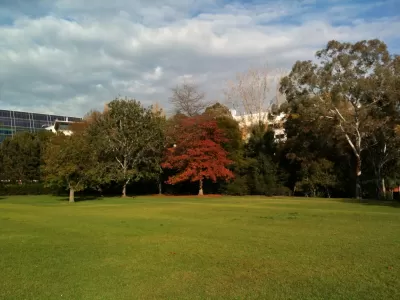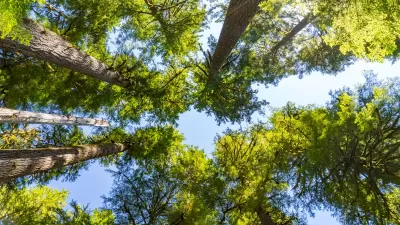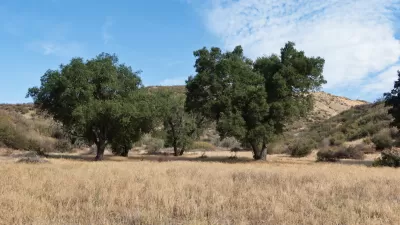All that pollen in the air giving you the sneezes is probably because of all the male trees your city has been planting.

Aimee Curtis of Greater Greater Washington writes that cities have long preferred to plant male trees because they tend to be cleaner than their female counterparts—not dropping fruit and seeds all over the sidewalk. However, as a consequence the pollen that the male trees release has nowhere to go but into the air. Curtis writes, that in a gender balanced situation, the female trees would soak up that floating pollen.
Horticultural epidemiologist Tom Ogren traces the modern preference for male trees to around 1950, when the USDA released a book that promoted planting male trees over female trees for easy, litter-free maintenance. The idea caught on with private homeowners, nursery suppliers, and city planners....
Favoring male trees isn't a bad idea in itself, and Ogren believes no one had any bad intentions. "But when a city does this on a massive scale, it has a huge impact on the health of the people who live there," he said to Governing. Ogren, who developed the Ogren Plants Allergy Scale (OPALS) used by the USDA and American Lung Association, says planting more female trees will reduce the pollen count in a city.
FULL STORY: Sniffling and sneezing? Too many male trees are (partly) to blame.

Manufactured Crisis: Losing the Nation’s Largest Source of Unsubsidized Affordable Housing
Manufactured housing communities have long been an affordable housing option for millions of people living in the U.S., but that affordability is disappearing rapidly. How did we get here?

Americans May Be Stuck — But Why?
Americans are moving a lot less than they once did, and that is a problem. While Yoni Applebaum, in his highly-publicized article Stuck, gets the reasons badly wrong, it's still important to ask: why are we moving so much less than before?

Research Shows More Roads = More Driving
A national study shows, once again, that increasing road supply induces additional vehicle travel, particularly over the long run.

Judge Halts Enforcement of Anti-Homeless Laws in Grants Pass
The Oregon city will be barred from enforcing two ordinances that prosecute unhoused residents until it increases capacity and accessibility at designated camping sites.

Advancing Sustainability in Los Angeles County Schools
The Los Angeles County Office of Education’s Green Schools Symposium brings together educators, students, and experts to advance sustainability in schools through innovative design, climate resilience strategies, and collaborative learning.

Using Old Oil and Gas Wells for Green Energy Storage
Penn State researchers have found that repurposing abandoned oil and gas wells for geothermal-assisted compressed-air energy storage can boost efficiency, reduce environmental risks, and support clean energy and job transitions.
Urban Design for Planners 1: Software Tools
This six-course series explores essential urban design concepts using open source software and equips planners with the tools they need to participate fully in the urban design process.
Planning for Universal Design
Learn the tools for implementing Universal Design in planning regulations.
City of Moreno Valley
Institute for Housing and Urban Development Studies (IHS)
City of Grandview
Harvard GSD Executive Education
NYU Wagner Graduate School of Public Service
City of Cambridge, Maryland
Newport County Development Council: Connect Greater Newport





























